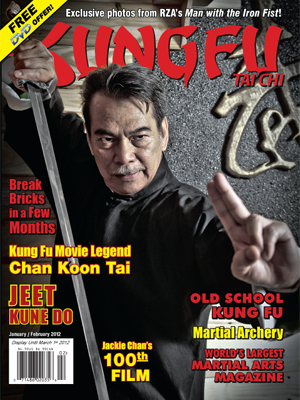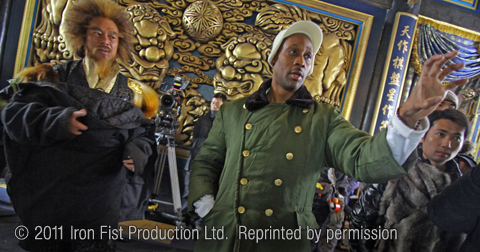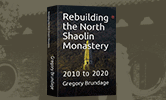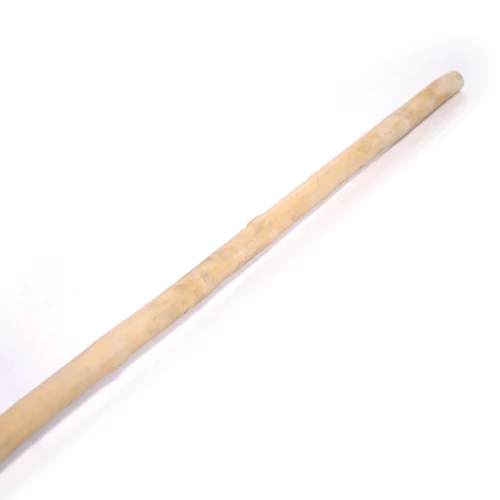By Gene Ching
 In the Hong Kong hit film Gallants, veteran kung fu star Chan Koon Tai plays Dragon, an aging traditional martial arts master struggling to remain relevant under the looming dominance of a franchised full-contact fight club. Gallants - originally titled Da Leui Toi (fighting stage 打擂台) in Cantonese - won Best Picture in both the prestigious 30th Hong Kong Film Awards and the discerning Hong Kong Film Critics Society Awards. This is a surprising accolade for a quirky indie flick. Made on a tight budget of only $5 million HK (about $642,000 USD), it's a moving tribute to the golden age of kung fu films from the '70s and '80s, a funny yet poignant film set in modern times. It showcases old school Shaw-Brothers-style fight choreography that only a star like Chan can bring. Now at 67, Chan is still going strong and Dragon was a perfect role for him. "I didn't need to memorize the script," he confesses in a mix of Cantonese and English, "I felt I was that kind of person."
In the Hong Kong hit film Gallants, veteran kung fu star Chan Koon Tai plays Dragon, an aging traditional martial arts master struggling to remain relevant under the looming dominance of a franchised full-contact fight club. Gallants - originally titled Da Leui Toi (fighting stage 打擂台) in Cantonese - won Best Picture in both the prestigious 30th Hong Kong Film Awards and the discerning Hong Kong Film Critics Society Awards. This is a surprising accolade for a quirky indie flick. Made on a tight budget of only $5 million HK (about $642,000 USD), it's a moving tribute to the golden age of kung fu films from the '70s and '80s, a funny yet poignant film set in modern times. It showcases old school Shaw-Brothers-style fight choreography that only a star like Chan can bring. Now at 67, Chan is still going strong and Dragon was a perfect role for him. "I didn't need to memorize the script," he confesses in a mix of Cantonese and English, "I felt I was that kind of person."
Chan Koon Tai (陳觀泰) is one of the most venerated kung fu movie stars ever to grace the silver screen. He is credited as starring in nearly 150 films since 1969 according to the Hong Kong Movie Database (hkmdb.com). To achieve such a massive filmography, he has worked steadily as an actor; turning out several films almost every year since he began. Chan was one of the first genuine martial arts stars - not just an actor who trained a little for his roles, but a talented traditional kung fu master and a full-contact fight champion. He was one of the top lead men to come out of Shaw Brothers, the most renowned kung fu film company, during the golden age of kung fu films.
And he's still making movies. In addition to Gallants, Chan had roles in thirteen other films over the last decade. Recently he faced Donnie Yen in 14 Blades (2010). Donnie is now Hong Kong's hottest kung fu box office draw and almost two decades Chan's junior. Nevertheless, Chan matched Donnie in fists and blades during their fight scene, showing once again that he's still got the stuff. He stars in two films releasing in 2011, White Vengeance and Assassin. It's an impressive filmography, especially considering that Chan got into the movie industry by accident, not by design.
Fireman of Conscience
A native of Hong Kong, Chan began his kung fu training when he was just seven. There were already some martial arts practitioners in his family, so it was a natural pursuit for a young boy. He became associated with Grandmaster Kan Tak Hoi (耿德海), a noted exponent of the monkey-based style of Tai Shing Pek Kwar (大圣劈挂), but Grandmaster Kan didn't want to teach anymore. He wanted to keep his style secret and only teach it within his family. Undaunted, Chan was persistent, and when a branch of Kan's school began recruiting, Chan Koon Tai was officially accepted into the lineage at age 10. "For my generation, life was simple," reflects Chan. "If you weren't going to school, there wasn't much to do." All of Chan's free time was spent practicing kung fu. By the time he reached his mid-teens, he was very dedicated, practicing 3 to 4 hours every day.
"At around 16 or 17, my parents wanted to send me to Beijing, so I ran away," confesses Chan. "I followed my sihing (elder martial brother 師兄) to earn money." Chan worked at the airport doing regular jobs and started to live on his own. At eighteen, Chan became a fireman. "I like doing work that can help people," says Chan. After years of kung fu practice, Chan was built tough, ready to face the physical demands of that noble profession. He stayed with it for several years. During that time, he witnessed a lot of tragedies. "I saw a lot of dark stuff, but it made me stronger as a person."
The late '60s were troubled times for Hong Kong. China was in the throes of the Cultural Revolution and Hong Kong was flooded with refugees and associated political turmoil. One early morning, Chan's fire engine ran over a bomb. Fortunately, no one was hurt, but the terrorist attack made Chan rethink his life. He decided to leave the fire department and seek work elsewhere. A friend introduced him to TVB, also known as Television Broadcasts Limited, Hong Kong's second commercial television station. He started doing basic jobs there, but his physical prowess from years of kung fu practice moved him quickly into stunt work. From there, Chan was well on his way to kung fu stardom.
Chan feels his progression from fireman to a professional martial artist had a significant impact on his character. Being a fireman taught him bravery, patience and the value of authenticity. Kung fu took that to a higher level. According to Chan, "Kung fu can change a lot about personal development, about how you interact with others and solve problems. If you want to become good, you must balance your heart and your mind. These are key things that drive everything else. When you use kung fu in real situations, you have to consider a lot with any course of action. Do you really want to destroy?"
Chan's early days in film were during the very birth of the kung fu movie genre; Chan got in on the ground floor. His rakish good looks, coupled with his solid kung fu skills, made him an attractive asset to fledgling film projects. Early on, Chan crossed paths with two film luminaries, the pioneering kung fu director Chang Cheh (張徹) and the legendary Bruce Lee. Chan was working at the harbor when the director asked for his support on an upcoming film project with Lee. Unfortunately, because of studio politics, many left the company and Chan wound up not working with him. Nevertheless, he has fond memories of Lee. "When you're in kung fu, there's a lot of honor," says Chan. "So when Bruce came, he checked out everyone in the film. I was introduced to Bruce. He was a very nice guy. We shook hands as friends. But there was this heavier actor and Bruce didn't like him. When they shook hands, Bruce made him fall. It was true kung fu power. I witnessed that personally."
Champion Iron Monkey
In 1969, the 1st Southeast Asia Open Martial Arts Tournament was held in Singapore. This was full-contact sparring, and Chan's master, a student of Grandmaster Kan, Chan Sau Chung (陳秀中), entered his team alongside more than ten other Hong Kong schools. "No gloves," recalls Chan Koon Tai, "no attacks to the eyes, throat and groin. There was minimal face protection. The action was stopped if someone fell. It was three, three-minute rounds in a roped ring. There was no more than 3 pound difference between fighters." Chan Koon Tai won five straight bouts, a few by knockout, and became the first Middleweight Champion.
The championship title boosted his film career. There were many great kung fu masters in the industry back then, but only a few had proven themselves in the ring. Winning an international tournament full-contact put Chan on a level above almost every other kung fu star, even today. While a few action stars boast winning competitive records, most (like Jet Li, Donnie Yen and now Taylor Lautner) are forms champions. Recently, several MMA champions have tried to break into Hollywood, but none have garnered top billing on any film to date, at least none that weren't direct-to-video.
Chan's increased notoriety established him as a powerhouse celebrity in the mighty Shaw Brothers stable of action stars, as well as a favorite of Chang Cheh's. During the '70s, Chan delivered many great kung fu films, some of the greatest classics of the genre such as Boxer from Shantung (1972), The Flying Guillotine (1975), Challenge of the Masters (1976), The Iron Monkey (1977), Executioners from Shaolin (1977), Crippled Avengers (1978), Killer Constable (1980), and many more.
Over the decades, Chan was also cast in several non-kung fu roles. His extensive experience has given him an on-screen gravitas that just can't be faked, even today. In his short cameo in the recent critically-acclaimed cop drama by Dante Lam, Fire of Conscience (2010), he completely steals the scene from the younger star of the film. Chan even had his own film company for two years.
"It's a different audience today," says Chan. When Chan was first making movies, the kung fu genre was a vast new frontier. Today, it is well established, no longer delegated to "B" movies. Of course, filmmaking has changed too. "We only had simple equipment back then versus today's computers. In the past, it was all manpower. Now it's technology. Now it's just one simple shot."
A True GallantLike his Gallants character Dragon, Chan stalwartly defends traditional kung fu in the modern world. "Now there are two arts: sanda (free sparring 散打) and bui yin (performance 表演)," says Chan. "Why is there a difference? Long ago, many different schools of kung fu - the leaders hated politics - and kung fu was separated into sanda and bui yin. Now too many people are in a rush to learn different forms. Many don't understand how to practice geibungung (basics 基本功). . . It's not just about movement, but also meaning. The teachings may change from different masters. Men and women are different, so when they do a form, it is different. It's unique to the individual. Discipline affects results. Kung fu - it's about every move having a lot of time put into it. This leads to real kung fu. Training just leads you there."
Chan sees a revitalization of traditional kung fu emerging now. He's very optimistic about the future, and has a surprisingly worldly perspective on the matter. "Now it's coming back. There are so many foreigners that are very curious. The Chinese people seem less serious about it now. But the foreigners are much more interested. True Chinese must always learn the real traditional way. Now they have to learn it from foreigners (laughs)."
Undeniably, kung fu is now a global phenomenon. And yet, the world has only begun to really plumb its depths. The fights and the films are only the flowers of the tree. What is seen in the ring or on screen only scratches the surface. Traditional kung fu is firmly rooted in Chinese culture. To understand kung fu on a cultural level, one must dig deep. "Personally, I feel that the Chinese martial arts are one of the classical Chinese arts like traditional music or calligraphy. It's on that same level with all Chinese traditional arts. If you look at kung fu, the movements are similar to painting, dance and other arts. Remember the Opening Ceremonies at the Beijing Olympics? Those performances were very traditional. That calligrapher who was painting giant characters on that huge video screen was doing kung fu."
What value does all this tradition have today? For Chan, it comes down to an often cited but never formally codified principle - the principle of moe dak (martial virtue 武德 commonly known by the Mandarin wude). Unlike the Japanese martial arts where warrior ethical codes are outlined in numerous samurai treatises like Hagakure or the Book of Five Rings, kung fu is more secular about its approach to moe dak. Moe dak permeates the old legends and consequently many kung fu movies, as they often draw from folktales and such. But where do you learn it? "I hope that kung fu practice itself will develop ethics and virtues. There's no specific standard of ethics and virtues. For me, it's a human combining with nature and other people harmoniously. Moe dak equals kung fu ethics and virtues.
"Some use martial arts in the wrong way, like breaking the law. This lacks moe dak. To practice, you must have good health and good reaction ability. This is basic. In ancient times, they used armor for protection. Today, with kung fu, we can protect ourselves. There no need for armor. Now war is different. Why do we still harm each other? This is why you need a clear mind. Moe dak expresses traditional virtue in the modern world.
"Now kung fu is also a sport. It's good for the body and health. It's easy to express kung fu skill today at competitions. Today's competitions are fair and safe, and we have professional judges. Most importantly, you can train your mind."

Movie Star with the Iron Fist
Gallants is a very unique film, truly groundbreaking in its vision, while very aware and respectful of the kung fu film genre. It was directed by two up-and-coming talents, Clement Cheng (鄭思傑) and Derek Kwok (郭子健). Hong Kong megastar Andy Lau was an investor. "Lau is really sharp and very successful," states Chan. "Foreigners loved the film. The filmmakers were not in it for the money as much as the quality. Andy supports older artists. The directors consulted both me and Bruce Liang Siu Lung (梁小龍) a lot (Bruce was Chan's costar, in the role of Tiger). The film was written based heavily upon our wisdom.
"I hope Gallants has an effect on the next generation. It's a low-budget film with meaningful messages. Do not fear failure. The elderly still have skill and can still do things. The message to Hong Kong is that Hong Kong should put more effort into making things happen and not give up easily.
"I knew this was a special film. Everyone had a tough time making the film, but we enjoyed it because of the messages. We really put our hearts into it. Outside, it was 36 °C (97 °F). Inside it was 40 °C (104 °F) because the lights were hot. No one complained. As long as you put your heart into it, there is no difficulty. You don't need to invest a lot of money."
At this writing, Gallants has yet to be picked up for American distribution. In contrast, Chan is also featured in the most anticipated kung fu film coming out of Hollywood, RZA's The Man with the Iron Fist. Written, directed and starring RZA of the Wu-Tang Clan, The Man with the Iron Fist also stars Russell Crowe, Pam Grier, Lucy Liu and Cung Le. It was filmed in China and is scheduled for release in 2012. "It was an honor working with him," say RZA respectfully about Chan. "I look to him like a big brother. He has been the hero in some of my most favorite films. Although I was the director, he could not equate the honor I felt having him being a part of my film. I chose hung gar as my choice of style based on his movie interpretations." Chan reciprocates, calling RZA by one of his other stage names, Bobby (Digital). "Bobby is a good director. He remembers every movie I was in, every scene - he remembers all my lines. Even I forget those."
Unlike many Chinese stars who really work towards Hollywood acceptance, Chan has been ambivalent. The Man with the Iron Fist isn't his first Hollywood project. In 1986, he had a role in Tai-Pan as a pirate. "In 1996, I was going to do a Hollywood film titled Dragon Seed. But I didn't do it. Other business interfered. I like to keep a low profile. I only do what I want to do."
What Chan wants to do is make another martial arts movie. He's currently developing a script for a film about MMA. "MMA is from real Chinese martial arts," boasts Chan. "I've gone through competition. I've learned a lot of judo and taekwondo. In MMA, no one holds with their hands. Real kung fu is hands and feet, but few know how to use it. A lot of people misunderstand kung fu. You need to know how to use every move. Masters know. Students may not know. Each move, when decoded, can be used. Sometimes practitioners can show a move, but not each application part. It makes me wonder if the teacher taught it all."
| Discuss this article online | |
| Kung Fu Tai Chi Magazine January/February 2012 |
Click here for Feature Articles from this issue and others published in
2012 .
About
Gene Ching :
Photo: © 2011 Iron Fist Production Ltd. Reprinted by permission.
Chan Koon Tai can be contacted through The Chinese Traditional Kung Fu Association, located at Flat Q, 13/F, Phase 1, Kwun Tong Industrial Centre, 472-484 Kwun Tong Road, Kowloon, Hong Kong. For more information, visit traditionalkungfu.com.hk. The author gratefully acknowledges Jenny Lie (JennyLie.com) for her assistance with translation.
![]()
![]() Print Friendly Version of This Article
Print Friendly Version of This Article
















